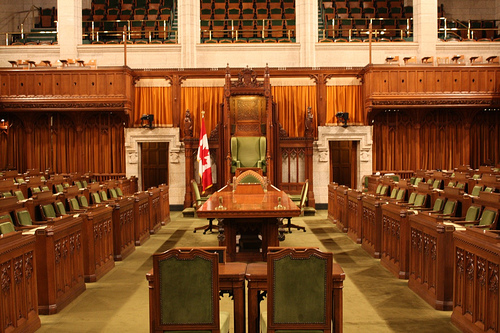Even a casual visitor to the House of Commons notices immediately its main feature. On one side of the House sit the government members. Directly opposite, separated by a legendary two swords lengths, sits the official opposition.
At the far end of the chamber, sitting on a chair above the fray, between the two, the Speaker presides over the back-and-forth debate. With passion and rage (feigned and real), opposition members ask the government (through the speaker) why it is making a mess of things. Less often, the “government in waiting” declaims what needs to be done differently.
Canadian parliamentary democracy follows what political scientists call the Westminster model (the British Houses of Parliament are located in the City of Westminster, a borough of London). The model is openly adversarial. Much like the criminal justice system, it features confrontation. Parliamentary orators are not just convinced of the rightness of their positions; they seek to win out over each other in the court of public opinion. Debaters seek a direct clash of ideas. Often, the public has to settle for conflicts between parliamentary personalities.
Out of opposing views should come — not truth — but clarity about choices being made by governments. The expectation — call it the democratic hope — is that observers of parliamentary debate should be able to make up their own minds about issues, and about parliamentarians.
Governments have no doubt they are making things better (and want to define better for us also). The role of the Official Opposition is to show what the government is doing wrong, and explain why it is wrong. The contrast provides for a continual spectacle. Except, is anybody watching?
It is true most citizens pay little attention to daily goings-on in parliament. This puts the Official Opposition at a permanent disadvantage since parliament is its best stage. To connect with the public, opposition leaders need superior media skills. For the NDP, facing a corporate-controlled media, there is no obvious route to getting favorable coverage.
The Conservative government abuses its power by spending public money to promote itself shamelessly. Stephen Harper advertised his “economic action plan” for months leading up to the 2011 election, and his new campaign is underway, more than three years before the expected October 2015 election.
Of course, Harper also spent Conservative party money to portray successfully (with little regard to the truth) two Liberal opposition leaders as worse than incompetent. His team will be gathering material on the leading NDP leadership candidates. The winner on March 24 can expect inflammatory attack ads to begin immediately.
The Westminster system eschews the consensual approach of most European legislative bodies; but, surprisingly often, in setting an agenda, a prime minister takes ideas from the opposition benches, and transforms them into government policy.
Jean Chrétien mastered this technique, and it contributed to his political longevity. Throughout his three terms, the Liberal PM introduced policies promoted by the opposition Reform party, regularly setting the opposition back on its heels. Chrétien sponsored initiatives such as getting tough with Quebec through adopting the Clarity bill, gutting unemployment insurance, making cuts to medicare funding, and ending the national welfare system (Liberals had created it in 1965). All of these were first suggested by Reform founder Preston Manning (aided by chief policy officer Stephen Harper).
The curious decision to reduce the stock of investment-grade securities for pension funds (so-called debt reduction) was straight Reform economics. Its own supporters may have expected the Liberals to grow public investment in green transport, education, health, the arts, parks and recreation. Instead the Liberals trumpeted paying down the debt — a Reform idea — and championed it as their own priority.
When Reform dumped its founding leader, and changed its name to the Canadian Alliance, Chrétien decided to beat the tax cutters at their own game. So, he introduced income tax reductions, and corporate tax cuts — totalling $100 billion — called the 2000 election, and won his last majority.
Stephen Harper sees things differently. Since receiving his first majority mandate May 2, 2011, he has proceeded to ram through the House of Commons — without regard for democratic niceties — an agenda designed to please only his base from the former Reform party, and its imitators, the Ontario Harris-style Conservatives. For example, it was not enough to end the long-gun registry, its records had to be burned.
Using closure, and time allocation, outrageously, to shut down debate in the House of Commons has forced the Official Opposition to take its message directly to the public. In January, interim opposition leader Nycole Turmel toured Quebec. Recently she has been talking to striking workers and those threatened with plant closures in Alma and Quebec City. This week, leading New Democrats such as Olivia Chow and Peter Julian have gone on the road to talk about economic security for seniors. Across Canada, MPs are using the pre-budget period to canvass constituents about priorities that have not been addressed by government.
The Harper approach — steamrolling ahead — prompted Quebec Premier Jean Charest, himself a former Ottawa Conservative leader and sometime Harper ally, to get straight to the point. Charest wants Harper to know democracy does not mean, “I won, you lost, I do as I wish.”
Duncan Cameron is the president of rabble.ca and writes a weekly column on politics and current affairs.
Dear rabble.ca reader… Can you support rabble.ca by matching your mainstream media costs? Will you donate a month’s charges for newspaper subsription, cable, satellite, mobile or Internet costs to our independent media site?



